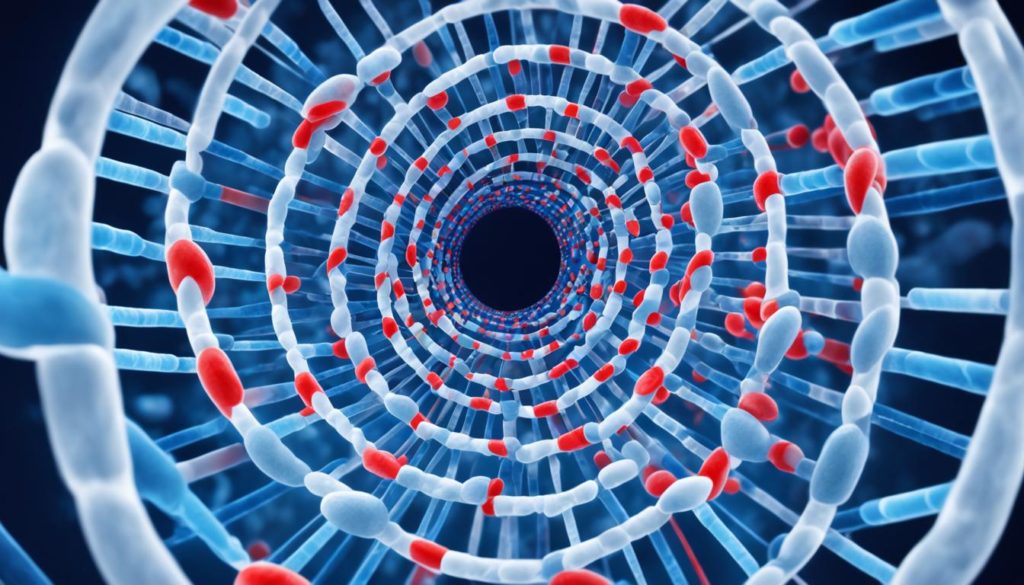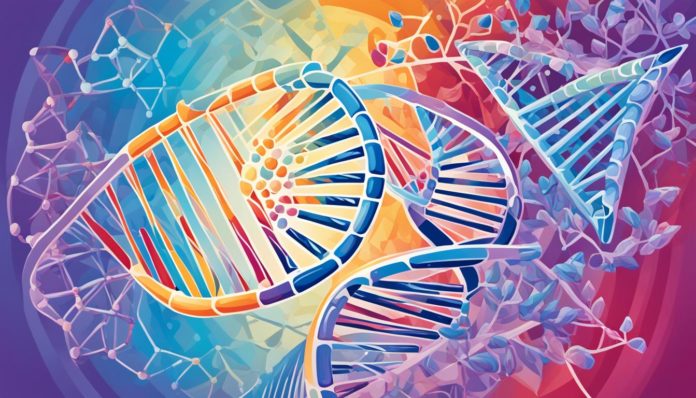Did you know men with BRCA gene mutations have a 20% to 25% chance of getting prostate cancer? This shocking fact underlines the need for more awareness and screening in men. While many think of BRCA mutations as linked only to women’s cancers, they also pose a big risk to men.
The Basser Center for BRCA at Penn Medicine addresses these risks, especially for prostate cancer. Their Men & BRCA project, led by Dr. Kara Maxwell, aims to close the knowledge gap. It focuses on improving care for men with these mutations.
Key Takeaways
- Men with BRCA gene mutations have a significant lifetime risk of developing prostate cancer.
- The BRCA Gene Prostate Cancer Link is less known than its link to breast and ovarian cancers.
- The Basser Center for BRCA is a leading institution in researching and treating BRCA-related cancers in men.
- The Men & BRCA program aims to improve education and clinical care for men at risk of BRCA-related cancers.
- Early screening and awareness are crucial in managing the prostate cancer risk associated with BRCA mutations.
What are BRCA1 and BRCA2 Genes?
The BRCA1 and BRCA2 genes play a big role in our genetic blueprint. They help keep a cell’s DNA stable. These genes are key in stopping mutations that can lead to cancer.

Definition and Function
BRCA1 and BRCA2 genes are known as tumor suppressor genes. They make proteins that fix damaged DNA. This keeps our genetic data safe and sound. These proteins are experts at fixing serious DNA damage called double-strand breaks.
Role in DNA Repair
The BRCA1 and BRCA2 genes ensure our cells stay healthy through DNA repair. When they work right, they fix DNA and stop cancer-causing mistakes. But, if these genes are faulty, the DNA repair doesn’t work well.
This malfunction lets cells grow out of control, which may form tumors. People with these mutations face a higher cancer risk. It’s because their DNA repair system is not as efficient.
| Gene | Function | Role in Cancer Prevention |
|---|---|---|
| BRCA1 | DNA Repair, Tumor Suppression | Maintains Genetic Stability |
| BRCA2 | DNA Repair, Tumor Suppression | Prevents Genetic Mutations |
How BRCA Gene Mutations Affect Prostate Cancer Risk
People with BRCA gene mutations have a much higher chance of getting prostate cancer. This risk increases because the mutations affect how DNA is repaired. Keeping cells healthy relies on these DNA repair mechanisms.
Increased Risk Due to BRCA1
Having a BRCA1 mutation greatly raises the chance of hereditary prostate cancer. Not just that, it also might lead to more aggressive cancer. Spotting it early is key for the best treatment paths.
Increased Risk Due to BRCA2
BRCA2 mutations push the risk of prostate cancer even higher than BRCA1. Studies show men with these mutations tend to have tougher battles with cancer, getting diagnosed younger. This makes it crucial to have treatments that specifically address their needs.

| Factor | BRCA1 Mutation | BRCA2 Mutation |
|---|---|---|
| Risk Increase | Significant | Higher |
| Aggressiveness | High | Very High |
| Age of Onset | Older | Younger |
| Treatment Considerations | Standard & Tailored | Primarily Tailored |
| Clinical Outcomes | Varies | More Challenges |
Symptoms and Diagnosis of Prostate Cancer in BRCA Mutation Carriers
It’s crucial to know the symptoms of prostate cancer in people with BRCA mutations for quick action and better treatment. These symptoms are similar to those in the general population but usually appear earlier and more intensely.
Common Symptoms
Prostate cancer’s signs can be easy to miss or mix up with other health issues. Key symptoms include:
- Difficulty urinating
- Frequent urination, especially at night
- Blood in urine or semen
- Persistent pain in the back, hips, or pelvis
- Erectile dysfunction
Screening Methods
The Prostate-Specific Antigen (PSA) test is key for spotting prostate cancer early. This blood test looks at PSA levels. High levels may suggest the presence of cancer.
The Digital Rectal Exam (DRE) is another screening tool. In this exam, a doctor checks the prostate for anything unusual. Finding cancer early through these methods can make a big difference in treatment success.
Importance of Early Detection
Catching prostate cancer early is super important, especially if you have a BRCA mutation. For BRCA carriers, prostate cancer can get worse quickly. This is why they need screenings more often and sooner.
Finding prostate cancer when it’s just starting allows for more treatment choices and a better chance at beating it. Knowing if you have a BRCA mutation helps decide how often you need to be screened.
| Screening Method | Purpose | Importance for BRCA Carriers |
|---|---|---|
| PSA Test | Measures PSA levels in the blood | Early detection of prostate cancer |
| DRE | Physician checks for prostate abnormalities | Identify irregularities early |
Keeping up with prostate cancer screenings and staying alert to its symptoms can help catch the disease early. This is especially critical for those with BRCA mutations, greatly enhancing the chance for successful treatment.
BRCA Gene Prostate Cancer Link
It’s important to understand how the BRCA gene mutation links to prostate cancer. This helps us see how certain cancers run in families. The BRCA1 and BRCA2 mutations play a big role in prostate cancer.
Hereditary Nature of the Disease
Prostate cancer’s link to the BRCA gene mutation shows it can be passed down from parents. This genetic link raises the risk of prostate cancer in families. That’s why genetic testing is key for those with a history of BRCA mutations.
Genetic vs. Acquired Mutations
There’s a big difference between genetic and acquired mutations. Genetic testing helps find inherited mutations, important for early diagnosis. Acquired mutations come from environmental factors and aren’t inherited. Knowing both types is crucial for the right treatment and understanding risk.
| Aspect | Genetic (Germline) Mutations | Acquired (Somatic) Mutations |
|---|---|---|
| Inheritance | Passed from parents to offspring | Not inherited; develop over a lifetime |
| Detection | Through genetic testing for prostate cancer | Through tumor biopsy and molecular profiling |
| Impact on Family | Potentially affects multiple family members | Typically individual-specific with no hereditary implications |
Impact on Treatment Options
The discovery of BRCA gene mutations changes how we treat prostate cancer. It leads us away from standard treatments to more specialized ones.
Standard Treatment Procedures
Typical treatments for prostate cancer include surgery, radiation, hormone therapy, and chemo. These methods are key for treating early-stage cancer. But, they may not work well for those with BRCA gene mutations.
Tailored Treatments for BRCA Carriers
For people with BRCA-related prostate cancer, custom therapy is key. One effective option is PARP inhibitors. They are good for treating advanced prostate cancer in those with BRCA mutations.
By using genetic info, we can make treatment for BRCA gene prostate cancer specific. Custom therapy not only works better but also cuts down on side effects. This improves life quality for patients.
Genetic Testing for Prostate Cancer Risk Evaluation
Genetic testing is a key way to figure out prostate cancer risk. It’s really important for those with cancer in their family. Knowing their genetic markers lets them act early to stay healthy.
Who Should Consider Testing?
If your family has had prostate, breast, ovarian, or pancreatic cancer, think about getting tested. People from specific backgrounds, like Ashkenazi Jews, also have a higher risk. Getting tested can pinpoint who needs closer watching and quick actions to stay safe.
Types of Genetic Testing Available
There are many tests for checking prostate cancer risk. Some tests look for lots of different gene changes. Others, like BRCA gene testing, check for specific mutations. Based on your personal and family medical history, genetic counselors will suggest the best test for you. This way, everyone gets the right kind of screening.
The Role of Family History in Prostate Cancer Risk
It’s crucial to consider how family history affects prostate cancer risk. Looking into both paternal and maternal cancer histories can reveal key insights. Especially, the presence of BRCA gene mutations might be highlighted.
Significance of Paternal and Maternal Histories
Both sides of the family history are key in gauging prostate cancer risk. If a man’s immediate family, such as brothers or fathers, had prostate cancer, his own risk increases. It climbs even higher with BRCA-related cancers in female relatives.
Recording these cases is vital as it aids in spotting hereditary patterns. Using a family tree helps healthcare experts study cancer spread and types within a family.
Family Health Discussions
Open talks on family health can boost early detection and preventive actions. Getting family members to share their medical past helps in understanding potential risks. This aids in informed choices regarding genetic testing and health steps.
These talks should stress genetic testing’s importance for those with a family history of prostate cancer. Knowing the disease’s hereditary traits aids in planning specific health strategies, improving results.
| Family History | Hereditary Prostate Cancer Risk |
|---|---|
| Paternal history of prostate cancer | Increased risk |
| Maternal BRCA-related cancer history | Significantly increased risk |
| Combined paternal and maternal histories | High risk, recommend genetic testing |
Support and Resources for BRCA Mutation Carriers
Individuals with BRCA mutations need a lot of support and resources. This section shows the importance of getting help, learning, and financial aid. These are geared towards making their lives better.
Support Groups and Counseling
Joining support groups and getting counseling is great for BRCA mutation carriers. They offer much-needed emotional support and information on managing risks. This helps lessen the emotional weight of living with BRCA mutations.
The Basser Center for BRCA creates special programs for men with these mutations. This ensures everyone affected gets the support they need.
Financial and Medical Resources
Navigating financial and medical help is key for those with BRCA mutations. There’s assistance for covering genetic tests and treatments. This makes sure care is manageable without financial hardship.
There are also programs for gender-affirming care. Using these resources can greatly improve care results and lower the stress of dealing with BRCA health issues.
Proactive Steps to Manage Prostate Cancer Risk
Making purposeful lifestyle changes and keeping up with medical check-ups can greatly lower prostate cancer risks. Those with BRCA mutations should pay extra attention to these steps.
Lifestyle Modifications
Adopting lifestyle modifications aimed at lowering prostate cancer risk is crucial. Actions to take include:
- Maintaining a healthy weight through a balanced diet.
- Engaging in regular physical activity.
- Adopting a diet rich in fruits, vegetables, and whole grains.
- Quitting smoking.
These lifestyle modifications are key not only for overall health but also for the health of your prostate.
Routine Screenings and Check-ups
Getting routine prostate cancer screenings is crucial, especially for those with BRCA mutations. The National Comprehensive Cancer Network (NCCN) suggests that screenings might start at age 40 for some, which is earlier than the usual recommendation.
Regular medical check-ups allow for early detection of cancer, which is key in treating it effectively. Work closely with your healthcare team to figure out the best screening schedule for you, based on your risk.
To wrap up, lifestyle modifications and routine prostate cancer screenings are essential in managing prostate cancer risk actively. Engaging in these practices provides important health insights and can lead to early detection, which could save your life.
Emerging Research on BRCA and Prostate Cancer
Prostate cancer research now pays more attention to BRCA gene changes. Experts are looking into how these changes affect the illness. They aim to find better ways to tackle cancer linked to BRCA genes.
Current Studies and Clinical Trials
Today, studies focus on the effect of BRCA mutations on prostate cancer. Many clinical trials are underway. They look into how these mutations influence treatment and the gene’s details.
Researchers seek new strategies to improve care for those with BRCA mutations. They want to make treatments more effective.
Future Research Directions
Research is advancing towards new discoveries about BRCA genes and cancer. Scientists aim to find preventive measures and better therapies. They want to understand the disease’s molecular basis better.
As prostate cancer research grows, it aims to improve how we treat the disease. Ongoing clinical trials are crucial. They will help develop new strategies to fight prostate cancer.
Conclusion
As we wrap up our talk on the BRCA gene and its ties to prostate cancer, it’s vital to understand the key roles of education, research, and full care for those at risk. Knowing about BRCA gene mutations helps doctors make better diagnosis and treatment plans.
The progress in genetic testing and personalized treatment highlights the need for proactive prostate cancer risk management. Tailored approaches help patients with BRCA mutations. They benefit from early detection and focused care, improving their chances of a better life.
It’s important to keep supporting the work of scientists, doctors, and support groups in tackling BRCA gene mutations. Studies like those in recent research are key to advances in understanding and treating prostate cancer. By staying informed and active, we can all help in the fight against this critical health issue.
FAQ
What is the link between the BRCA gene mutation and prostate cancer risk?
BRCA gene mutations increase the risk of prostate cancer. They can lead to more aggressive forms and early onset. This is compared to those without the mutations.
What are BRCA1 and BRCA2 genes?
BRCA1 and BRCA2 are genes that help suppress tumors. They maintain our genetic material by fixing DNA breaks.
How do BRCA gene mutations impair DNA repair?
Faulty BRCA genes don’t repair DNA breaks well. This can lead to cancer, including a higher risk of prostate cancer.
What is the significance of hereditary prostate cancer?
Hereditary prostate cancer comes from genetic mutations like BRCA1 and BRCA2. These mutations make prostate cancer more likely in families. This requires genetic testing and risk assessment for family members.
How does having a BRCA1 mutation affect prostate cancer risk?
BRCA1 mutations raise the risk of getting prostate cancer. The risk is significant but less than with BRCA2 mutations.
What impact does a BRCA2 mutation have on prostate cancer?
BRCA2 mutations greatly increase prostate cancer risk. They often lead to a more aggressive disease and earlier diagnosis.
What are the common symptoms of prostate cancer in BRCA mutation carriers?
Symptoms include difficulty urinating and needing to urinate often, especially at night. There’s also pain during urination or ejaculation, blood in urine or semen, and pain in the back, hips, or pelvis. BRCA mutation carriers might experience these symptoms at a younger age.
Why is early detection important for BRCA mutation carriers?
Early detection is key as it improves treatment outcomes for BRCA carriers. It helps catch the disease early when it’s more manageable.
What screening methods are recommended for prostate cancer in BRCA mutation carriers?
The PSA test is recommended for early detection of prostate cancer. Regular screenings should start around age 40 for BRCA carriers.
What is the difference between genetic (germline) and acquired (somatic) mutations?
Germline mutations are inherited and present in every cell. Somatic mutations are acquired later, often due to environmental factors. Understanding this is important for treatment and assessing risk.
How are treatment options for prostate cancer influenced by BRCA mutations?
BRCA mutations can change prostate cancer treatment options. For example, PARP inhibitors may work better for those with these mutations. This allows for personalized treatment approaches.
Who should consider genetic testing for prostate cancer risk?
Those with a family history of prostate, breast, ovarian, or pancreatic cancer should consider genetic testing. This is especially true for those of Ashkenazi Jewish descent and families with known BRCA mutations.
What types of genetic tests are available for prostate cancer?
Tests include broad-panel and targeted BRCA gene analysis. They are chosen based on personal risk and family history, often with a genetic counselor’s advice.
Why is a family history of prostate cancer significant?
A complete family history helps assess prostate cancer risk. It can show the chance of having inherited BRCA mutations.
What support resources are available for BRCA mutation carriers?
Support includes counseling, groups, financial help, and gender-affirming care. The Basser Center for BRCA provides specialized programs for BRCA carriers.
How can lifestyle modifications help manage prostate cancer risk?
Living healthily, like keeping a good weight, exercising, eating well, and not smoking, helps manage risk. Regular checks, especially for BRCA carriers, are vital.
What current research is being conducted on BRCA and prostate cancer?
Research is focused on new treatments and understanding BRCA in cancer. The goal is better prevention and targeted therapies.


